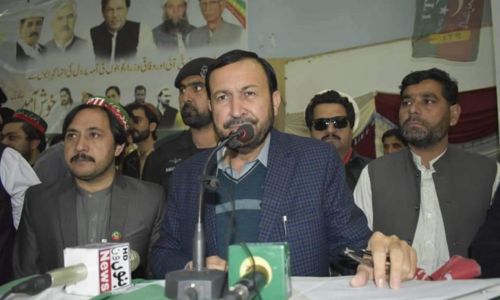PESHAWAR: Khyber Pakhtunkhwa Chief Minister Mahmood Khan and provincial minister Anwar Zeb on Friday moved the Peshawar High Court challenging the Election Commission of Pakistan’s revised code of conduct, which barred public officeholders from campaigning in the second phase of local body elections in the province.
In the joint petition, they also requested the court to declare unconstitutional and illegal the March 11 notices issued to them by the Lower Dir district monitoring officer (DMO) for allegedly violating the code of conduct through participation in a public meeting.
The petitioners prayed the court to declare that the March 11 ECP order, wherein the revised code of conduct was issued, negated the principles of the independence of judiciary and violated the Constitution and the Elections Act, 2017, and the rules made under them.
They also sought orders for the respondents, including the DMO, to withdraw the March 11 notices after declaring them illegal.
Also challenge notices issued for attending Dir public meeting
The chief minister and the minister also prayed the court to direct the respondents, including the ECP, to withdraw the March 10 order for the revision of election code of conduct.
They sought an interim relief in the form of suspension of those notices and ECP order until the final disposal of the petition.
The respondents in the petition are the ECP through its secretary, chief election commissioner, regional election commissioner of KP, and Lower Dir DMO.
Following the public meeting in Balambat area of Lower Dir district, the DMO had issued notices to several public officeholders, including Prime Minister Imran Khan, federal ministers Shah Mahmood Qureshi, Pervez Khattak, Asad Umar and Murad Saeed, KP Governor Shah Farman and the petitioners, asking them to appear in person or through counsel before the DMO.
The petition filed through lawyer Ali Gohar Durrani said previously, the Representation of People Act, 1976, was enacted to provide for the conduct of elections to the National Assembly and provincial assemblies, and to guard against corrupt and illegal practices.
The petitioners said the Representation of the People Act, 1976, was repealed and the Elections Act, 2017, enacted to consolidate and unify laws relating to the conduct of elections and matters connected therewith.
They said Section 233 of the Election Act, 2017, provided for the code of conduct for political parties, contesting candidates etc, while Section 234 of the Election Act, 2017, was related to the monitoring of election campaign.
The petitioners contended that while the parliament was not in session, the president of Pakistan promulgated the Elections (Amendment) Ordinance (Ordinance I of 2022) on Feb 21.
They said through that ordinance, Section 181-A was inserted into the Election Act, 2017.
“The said amendment in furtherance of the democratic ideals allows members of parliament, provincial assembly, or elected members of local government, including members holding any other office under the constitution or any other law, to visit or address public meetings in any area or constituency,” the petition read.
The petitioners said in view of that amendment, they held a public meeting in Balambat tehsil on March 11, while a notice was issued to them by the DMO the same day under Section 234 of the Act.
They contended that after insertion of Section 181-A in the Act, the actions of the petitioners stood ‘well within the mandate of the law’.
The petitioners said an alleged revised code of conduct, which had not been published in the official gazette or posted on the official website of ECP, had purportedly been issued by the respondents on March 10.
They contended that the said revised code was against all the norms of legal principles and had set at naught the said amendment.
Published in Dawn, March 19th, 2022















































Dear visitor, the comments section is undergoing an overhaul and will return soon.